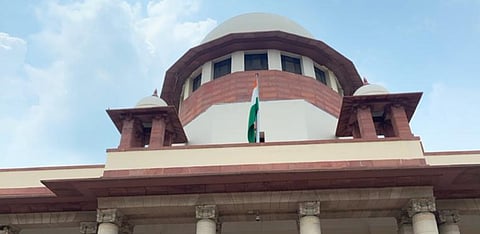

The case is set to take an interesting turn with the Deputy Speaker, Narhari Zirwal, defending himself that he had given 'sufficient' time to the rebel MLAs to reply to the disqualification notices against them, and that the removal notice against him given by them suffered from certain infirmities which he could not ignore.
– – –
A Chief Justice of India ('CJI') N.V. Ramana-led bench earlier today directed the newly-elected Speaker of the Maharashtra Legislative Assembly, Rahul Narwekar, not to take any decision on the disqualification of the Uddhav Thackeray-led faction of the Shiv Sena. The bench, which also comprised Justices Krishna Murari and Hima Kohli, told the Solicitor General ('SG'), Tushar Mehta, to inform the same to the Speaker as no one was present in the court on his behalf.
The development followed after senior advocate Kapil Sibal, joined by senior advocates Abhishek Manu Singhvi and Devdatt Kamat, mentioned the matter today before the CJI. Sibal told the bench that the matter was to be heard today but it was not listed somehow. He pointed out to the bench that the Speaker has asked the Members of Legislative Assembly ('MLAs') led by former Maharashtra Chief Minister ('CM') Thackeray to appear on Tuesday before him. He urged the court that the status quo ought to be maintained with regard to disqualification proceedings against both the factions, that is, the Thackeray-led and the current Maharashtra CM Eknath Shinde-led factions of Shiv Sena.
CJI Ramana sought to inquire as to who was appearing for the Speaker, as no one was present despite being informed of the mentioning, as claimed by Kamat. Chief Justice Ramana then asked SG Mehta, who was appearing for the Governor, to convey to the Speaker not to go ahead with disqualification proceedings. The CJI also told Sibal that the matter would require the constitution of a bench and the same will take some time.
Last month, a vacation bench comprising Justices Surya Kant and J.B. Pardiwla extended the time for Shinde and 15 other rebel MLAs to file written responses to the Deputy Speaker's disqualification notice till July 12. However, in the meantime, then CM Thackeray had to resign as the Governor ordered a floor test for the Thackeray government to prove its majority, which the same bench refused to stay.
After the formation of the new government led by the Shinde faction of the Shiv Sena and Bharatiya Janta Party, and with the election of the latter's Narwekar as Speaker, notices were issued to the MLAs siding with Thackeray as they defied the whip issued by the Shinde faction.
Responding to court's notice on why he 'rejected' the notice from Shiv Sena's rebel MLAs to remove him from office on June 21, Deputy Speaker Narhari Zirwal, in his reply, has said that his office did receive a notice allegedly signed by 39 MLAs from an unknown person. Similarly, a mail was sent from the mailing address of one Vishal Acharya, an advocate, appending the said notice, he admitted.
He claimed that his duty was to verify and ascertain the authenticity as well as the genuineness of the purported notice seeking his removal as none of those MLAs who purportedly signed it had met him. Zirwal also had no reason to conclusively determine whether the signatures were of those MLAs. Zirwal claimed that had he not refused to take the notice on board because of these infirmities, he would have been guilty of dereliction of duty.
Distinguishing the Supreme Court's judgment in Nabam Rebia & Bamang Felix versus Dy. Speaker & Ors. (2016), popularly known as the 'Arunachal Pradesh President's Rule case', Zirwal submitted that this judgment was not applicable to the facts of the instant case, since there was no valid notice of removal of deputy speaker as contemplated under Article 179(c) of the Constitution, read with the Assembly rules. He argued that notice of removal can only be given when the assembly is in session. Besides, he pointed out that the purported notice did not contain any specific charge against him, as required by the assembly rules.
In the Arunachal Pradesh President's Rule case, a five-judge Constitution bench had held that it would be constitutionally impermissible for a Speaker to adjudicate upon a disqualification petition under the Tenth Schedule of the Constitution, while a notice of resolution for his own removal from the Office of Speaker is pending.
Zirwal also sought to justify the 48-hours' time limit for responding to the disqualification notices. He said 48 hours were given at first instance, and the MLAs never approached him and sought more time. He added that when the MLAs could file a petition in the Supreme Court within 24 hours, he failed to understand how and why the 48-hours' notice to file a reply is unreasonable.